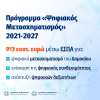Greece - Digital Transformation Strategy for 2020-2025
The Digital Transformation Strategy 2020-2025 of Greece, called also the 'Digital bible' is the main strategic document, which sets priorities for the digital transformation of the country, as well as goals to develop the digital skills of Greek society - at all levels and ages. The Greek Bible outlines the guiding principles, strategic axes, and interventions on a horizontal and vertical level that aim to enhance and support the digital transformation of Greek society and economy. The Greek strategy underlines 7 primary objectives as well as supporting activities across specific areas, such as initiatives aimed at citizens or the education sector.
Main objectives
- Safe, fast, and reliable access to the Internet for all.
- A digital state, offering better digital services to the citizens for all life events.
- Development of digital skills for all citizens.
- Facilitating and supporting the transformation of companies and SMEs into digital enterprises.
- Strengthening and enhancing digital innovation.
- Making productive use of public administration data.
- Incorporating digital technologies within all economic sectors.
Digital skills for citizens
In the area of Digital skills for Citizens the strategy has the following goals:
- Enhancing the integration of innovative technologies in the educational process of primary and secondary education.
- Institutionalisation of weekly information technology (IT) hours in all classes of secondary education.
- Embedding digital skills courses within all curricula in higher education institutions.
- Establishing a Digital Citizens' Academy to offer online learning courses on the topic of digital skills through a user-friendly online platform.
- Launching training programmes for all ages, social backgrounds and professionals from a variety of sectors via a lifelong learning approach.
- Implementing a single and systematic mechanism of certification for digital skills programmes and adapting them to address changing labour market needs.
The Strategy also sets goals to provide digital skills training programmes for entrepreneurs in order to facilitate the digital transformation of their sectors and businesses. Another strong focus of the Greek Digital Bible falls on the Digital Skills Pillar, which incorporates another 3 strategic goals and underlining activities and priorities.
Upskilling goals - Digital Skills Pillar
Goal #1 Digital Investment in the Human Resources of the Country
- Establishing a Reference Framework Development and Categorisation for the certification of educational programmes.
- Launching actions aiming to improve the digital skills of civil servants and employees within local and regional government and public administrations.
- Fostering and developing digital skills of pupils, students and teachers across educational levels.
- Supporting the development of digital skills for entrepreneurship and innovation.
- Launching a variety of actions to contribute to enhancing both basic and advanced digital skills.
- Helping citizens acquire digital citizenship skills.
- Setting up a new, organic unit - the National Centre for the Development of Digital Skills - NCDDS - to operate within the framework of the National Network of Technology and Research Infrastructures (GRNET SA).
Goal #2 Citizens' Digital Academy - the national portal for digital capabilities in Greece
- Increasing the availability and accessibility of education and training programmes for the acquisition of digital skills in the context of the entire Greek population - at basic, intermediate and advanced level.
- Strategic planning for education, based on best practices and widely used educational models and standards, gathered from all around Europe.
- Addressing individual needs by creating a self-assessment mechanism for determining different levels of digital competence and defining a personalised learning path.
- Developing a unified homogenisation mechanism for the certification of education and training programs in digital skills at the national level.
- Offering a variety of educational programmes both online (through modern and asynchronous education) and in face-to-face.
- Creating a 'Collaboration Platform' to act as the central hub for cooperation between public and private digital education providers.
Goal #3 National Coalition for Digital Skills and Employment
- Dissemination of initiatives on digital skills in Greece, which are aligned to latest EU policies which guide member-to-member cooperation when it comes to information society and in acquiring and developing digital skills.
- Launching actions to strengthen digital skills and address the digital divide in all sectors of the Greek economy and society.
- Establishing an action plan focusing on the education of the unemployed, upskilling and reskilling of the workforce, the acquisition and upgrading of digital skills of students and teachers, and the activation of young people for careers in the information and communication technology (ICT) sector.
Strategy Details
The Greek Digital Transformation Strategy (2020-2025) will be funded via a combination of national and European financing.
The Greek Ministry of Digital Governance has designed the strategy in close cooperation with with stakeholders from the public and private sector as well as with the research and academic community and civil society organisations.





